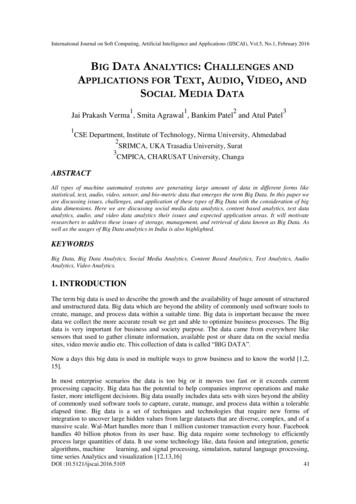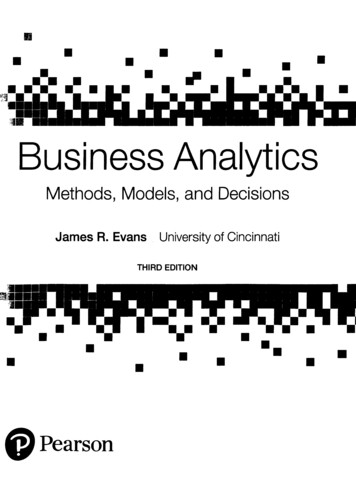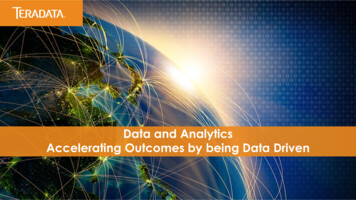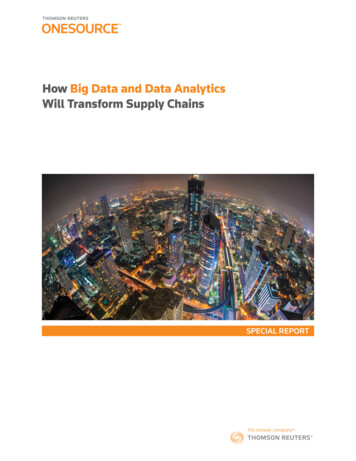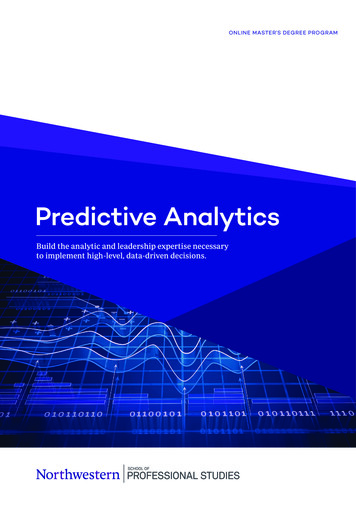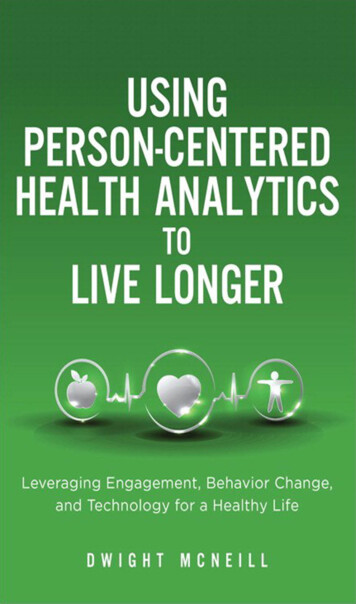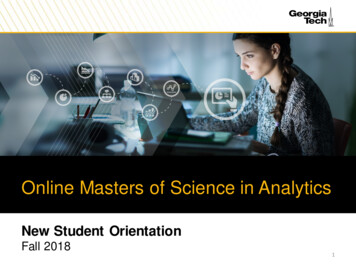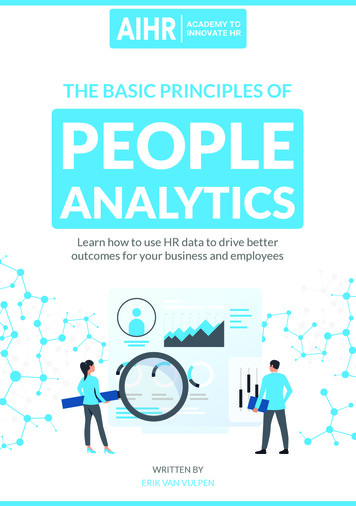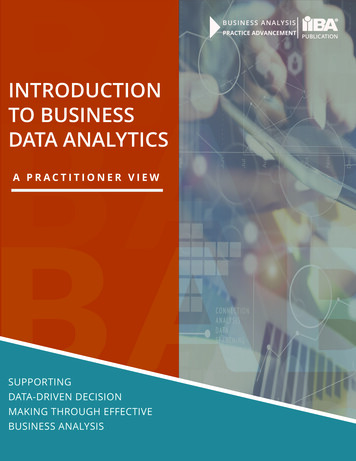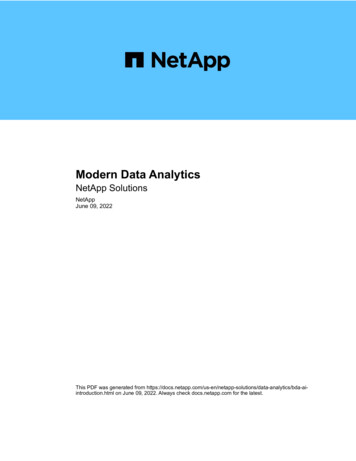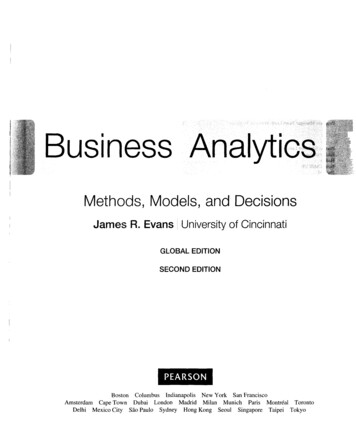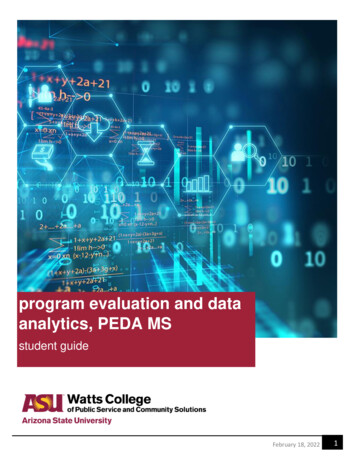
Transcription
program evaluation and dataanalytics, PEDA MSstudent guideFebruary 18, 20221
Table of ContentsProgram Welcome . 3Advisor Contact Information . 4Curriculum and Graduation Checklist . 5Program Overview. 6Tenants of Success. 6Prior to Program Start . 8Technology. 8Software . 8Pre-Requisites . 9Pace of Program and Options . 10PEDA Sample Schedule Options. 11Additional Course Information . 11Community Analytics (CPP 529) . 12Applied Project – CPP 593 Information . 12How to Register for Classes. 12Diversity, Equity, and Inclusion. 14Department and University Policies and Procedures . 15Maintaining Continuous Enrollment . 15Interactive Plan of Study (iPOS) . 15Transfer Coursework . 16Academic Policies . 16Academic Integrity . 16Satisfactory Academic Progress . 16GPA Policy . 17Program Policies . 17Grades of Incomplete . 17Conduct Policies . 18Student Responsibilities and Policies . 18Student Conduct and Communication. 18Student Code of Conduct . 18Academic Grievance Process . 18Useful Websites for University Resources. 19February 18, 20222
Program WelcomeDear PEDA Students,On behalf of the faculty and staff at Arizona State University, we would like to welcome you to the 2022-2023 academicyear.The MS in Program Evaluation and Data Analytics (MS-PEDA) is a new degree option to train public and nonprofit sectorleaders in data-driven management. The degree combines two important fields – statistical training in causal analysis,econometric techniques, and research design that serve as the foundations of evidence-based management andprogram evaluation, and data science courses that prepare students to work with complex datasets, effectivelyvisualizing and communicate results, and participate in the data science ecosystem of open source software andcollaboration.Data is ubiquitous in organizations, but it rarely exists in clean spreadsheets. Organizations committed to evidencebased management need employees that can quickly compile data and produce insightful analysis. The ability togenerate new datasets from multiple sources using non- standard and unstructured inputs adds value to organizations.Learning a data programming language is like learning a musical instrument or a foreign language– you need practice tobecome fluent. You will be immersed in the theory and application of critical thinking using data and receive lots ofpractice with tools in the data science ecosystem. You will develop expertise to effectively implement projects in realworld organizational settings.This degree is specifically tailored toward individuals with a background in social sciences and a commitment to publicservice. The PEDA degree prepares students to work as analysts and managers in public sector or social purposeorganizations, as independent evaluators, or transition into PhD programs. Whatever your pathway, we welcome you tothe program and look forward to working with you over the next semesters.M.S. in Program Evaluation and Data AnalyticsInterdisciplinary Graduate Degree ProgramsWatts College of Public Service & Community Solutions I Arizona State UniversityFebruary 18, 20223
Advisor Contact InformationCrystal Ramirezidpadvising@asu.edu602-496-1019Crystal Ramirez is your Academic Success Advisor. Crystal graduated in 2021 with a Mastersof Education in Higher Education. She also has a Bachelor’s degree in Health Sciences: PublicHealth. She was previously a Success Coach working at ASU Online with graduate students.Prior to her time at Arizona State University, Crystal worked in the non-profit industryhelping high school students through the college process and assisted them in findingscholarships and financial aid. Crystal is the Advisor for both the Masters of Public SafetyLeadership and Administration (MPSLA) and Program Evaluation and Data Analytics (PEDA)MS graduate programs.Academic Advising can assist with the following things: Directly support students’ academic needs.Assists students in planning courses through graduation to ensure students are meeting their graduationtimeline goals.Help with course registration, overrides needed and answer questions about policies and procedures.Assist student with options moving forward when the unexpected comes up.Some examples of topics that can be covered in an advising appointment include questions related to theiPOS, class schedules, degree checklists, advising holds, etcIf you have a quick question or need an override for a course, simply send an email to idpadvising@asu.edu.Please use your ASURITE ID for a faster response. You should receive a response within 2 businessdays.If you have read through the entire handbook and still have questions, you may schedule an appointment withyour AA here: intmentThings to note: If you are not able to keep your appointment, please pull up your appointment confirmation email, and selectcancel or reschedule. We appreciate your assistance with this so we can assist other students in a timelymanner.Please come to your appointment prepared with questions. Most advising information you will need islocated in your student handbook.Students who schedule an appointment MUST BE ON TIME. There are several instances where there are backto-back appointments. If a call is missed or a student does not join the zoom call, the Academic Advisor willonly wait 5 mins for the student to call back or join the zoom call before marking the appointment as a noshow.If for some reason the days and times for appointments do not align with your schedule, pleaseemail idpadvising@asu.edu ASAP so that we can coordinate.Students are responsible for completing the Welcome page of their iPOS, acknowledging Graduate Collegepolicy. Furthermore, students are required to complete their iPOS once they have enrolled in 50% of theircourses (more information can be found on page 11)February 18, 20224
Watts College of Public Service and Community SolutionsProgram Evaluation and Data Analytics Masters of Science (Online)Curriculum and Graduation Checklist (33 Credits Total)Fall 2022Required core courses (21 credit hours)Course NameCreditsCPP 523 Foundations of Program Evaluation I: Multiple Regression3CPP 524 Foundations of Program Evaluation II: Research Design3CPP 525 Foundations of Program Evaluation III: AdvancedRegression Tools3CPP 526 Foundations of Data Science I: Introduction to DataProgramming in R3CPP 527 Foundations of Data Science II: Data Wrangling3CPP 528 Foundations of Data Science III: Project Management3CPP 529 Community Analytics3Semester TakenGradeRestricted Elective course (3 credit hours-choose 1 course. May not take all three since they all have the same concepts taught)Course NameCreditsPAF 541 Program Evaluation OR NLM 530 Program Eval & InfoMgmt OR SWG 623 Program EvaluationSemester TakenGradeSemester TakenGrade3Elective courses (6 credit hours-choose 2 courses)Course NameCreditsElective *Elective *33Required culminating experience (3 credit hours-taken during your last semester)Course NameCreditsCPP 593 Applied ProjectSemester TakenGrade3A suggested course schedule is available to you on page 11. The required core classes emphasize knowledge and skills allgraduates must have. Electives supplement core knowledge and allow you to customize your degree.*Electives: You can select two electives in any topic related to evaluation, research methods, data science, or evidence-basedmanagement from any other programs available through ASU online. Note that some programs have restrictions on whichstudents can take their classes and pay attention to prerequisites when selecting courses.You may view previous courses that have been approved by the program director here: es/. You are also free to identify whichever courses fit your program goals that are related to the topics mentionedabove. Any courses not on the list need to be approved by your advisor/director. For fast review, send course information with acurrent syllabus to IDPAdvising@asu.edu. ASU Online is a dynamic environment with new courses being added every semesterand some courses not offered regularly. As a result, we do not try to keep an exhaustive list of options – you are encouraged tosearch beyond the basic list of pre-approved courses.Please reach out to our advising team at idpadvising@asu.edu with any questions.February 18, 20225
Program OverviewArizona State University's Master of Science in Program Evaluation and Data Analytics provides you with a solid grounding in theapplied and conceptual tools of conducting program evaluations. It is designed to provide graduate level instruction andexperience in conducting evaluation research with training in a broad spectrum of evaluation research methods. With increasingfrequency organizations are required to demonstrate effectiveness of programs for continued funding and accountability toconstituents.This program was developed by the College of Public Service & Community Solutions in response to the increasing demands foraccountability in the public, nonprofit and private sectors. The demand for professionals trained in evaluation research isparticularly strong in local and state government but is also increasingly critical for nonprofits and NGOs. Upon graduation, youwill be a specialist in this area of research and your training will have broad applicability for public and private sector programsand policies, as well as programs and policies initiated by nonprofit and non-governmental organizations.You will receive instruction in program assessment and evaluation, research methods, quantitative techniques, and policyanalysis. You will also choose advanced courses from quantitative methods, qualitative methods, or geospatial methods. Thefinal applied project requires an evaluation of a specific program, policy, or practice chosen from the cognate areas ofspecialization.The program prepares you to conduct sound and methodologically appropriate program evaluations. By the end of the programyou will be able to successfully conduct a program evaluation using the appropriate research design, methods and analysis. Youwill have acquired the skills needed to work conduct evaluations in any number of specific fields.Tenants of SuccessOnline education is a rapidly-evolving space that provides flexible opportunities for professional development and intellectualenrichment. You may be new to online education, or you may be familiar with other models (each program is organizeddifferently). We want to take a moment to emphasize a few important principles that will help you plan for the program and besuccessful. Online programs offer the convenience of working from anywhere, but they are not easier or faster than in-persondegrees. ASU recommends that students budget 18 hours per week for each 3-credit course. This will vary greatly byyour familiarity with topics and personal proclivities. Be sure to allocate adequate time for classes until you arecomfortable with the program pace. Weekly readings and lectures are designed to be consumed iteratively while working through labs. Each unit willtypically provide a concise introductory lecture to the topic and more detailed content for reference. We find thattechnical material is processed better while immersed in a lab because the vocabulary will not always make sense untilyou have a concrete problem for context. Most students will read or watch the introductory lecture, start the lab, thenread more content and work through sample problems when stuck. This is an active and immersive program organized around weekly assignments. Labs are not strictly procedural – theyrequire problem solving and synthesis of prior material, which means you will get stuck. Start labs early, work withclassmates, and ask questions in course forums. You are encouraged to collaborate on assignments and post questions in course discussion boards. You will find thatFebruary 18, 20226
asking questions requires you to be precise and provide reproducible examples, so they are helpful learning tools. Youwill find that when you need to pick up new skills as a professional you will rely more on discussion boards like StackOverflow than textbooks, manuals, or colleagues. Learning the protocols for interacting in these forums will allow youto be an active member of a global data science community. It is important to recognize that this program exists at the intersection of management, public policy, computerscience, and statistics. Students come from many different undergraduate degree programs and career paths.Disciplinary diversity is a strength of the program, but it also means people will have different levels of experience andexpertise on each topic. We actively promote a positive learning environment that values disciplinary diversity,prioritizes growth over mastery, and does not force students to compete for points. The interdisciplinary nature of thestudent body is reflective of the interdisciplinary nature of teams you will likely encounter in your career. The student that earn the highest marks in the program tend to be the students that actively participate in discussionsand review sessions. The students that struggle are often those that are too shy to ask questions. Don’t be too proudto struggle, you will cheat yourself out of opportunities to learn. Do not hesitate to schedule virtual office hours if a concept is not clear. If you have a specific question about an errorin code or a calculation use the discussion boards. If your question is about a concept or broad principle, schedule aZoom call with an instructor. A 15-minute call to identify a point of confusion is more productive than postingquestions on the discussion board when the answers do not make sense. 7.5 week semesters move quickly and can be unforgiving if you get sick or have to travel for work. Most courses try tobuild in a buffer so that you can drop a lab or regain some points so that learning models can accommodate the livesof real people. If you are falling behind reach out as soon as possible. Content is cumulative, so you cannot skip an assignment andstart fresh on the next lab without catching up first. Deadlines can snowball quickly if you get behind. Vocabulary is an important part of your training because it is necessary for collaboration on interdisciplinary teams,documenting your work, and searching for help on the internet. We avoid jargon when possible but use a lot ofnecessary terminology throughout the program. Embracing the vocabulary is an important part of joining the globalcommunity of data science professionals. Technical knowledge is never clear the first time you learn it. Courses are sequenced so that content learned in one classwill be applied in subsequent classes. Foundations of Program Evaluation I covers mechanics of regression models, forexample. Evaluation II and III revisit these concepts by replicating regression models from published studies, giving you achance to revisit material from Evaluation I. The short semesters move quickly and cover a lot of content, so don’t benervous if concepts are not perfectly clear the first time you encounter them.2February 18, 20227
Prior to Program StartIt is important to acquire course materials and requisite technologies prior to the start of class.TechnologyWe don’t have a specific technology package that is recommended for the program, but since many of the courses are onlineand data-intensive it is suggested that students use hardware suitable for the coursework ahead.LaptopsAll core courses will make heavy use of the R program, which requires a decent amount of computing power. Wesuggest that your primary computer for labs and projects have the following specs: 8 or 16 GB of RAM (you can operate with 4, but it will be slow)64 bit operating systems100 GB of free storage space for projects and labsAll else equal, faster processors are betterYou will be spending a lot of time on your computer over the next year, so having a fast and reliable machine willmake your life easier. You do not have to buy the latest Macbook Pro – you can find a decent laptop that meetsthese specifications for under 500.Operating Systems:Both Windows and Mac machines are fine, though there is better support for Windows environments.The software should function fine in Linux environments, but no support is provided for this OS. Chromebooksand tablets are not appropriate for the type of work we will do in this program.Internet Setup and Hardware:Make sure you have a reasonable internet speed to participate in online sessions, to stream video, and todownload data needed for assignments. It should be above 100 Mbps.You will need a webcam and a functional computer microphone to participate in online sessions. Make sure thatyour laptop equipment is working properly or purchase a camera and headset that can be plugged into yourcomputer’s USB. Feel free to reach out if you are getting a computer for the program and you have questionsabout appropriate technology.SoftwarePrior to the program start make sure you have the following software installed:Data AnalyticsWe will be using R extensively for core courses in the program. R is a free open-source program developed specifically forstatistics and data analytics. Download the most recent version here: https://cran.rstudio.com/R Studio provides a nice user interface and some powerful tools to extend R. Install the free version of R StudioDesktop: Hub is a collaboration tool for data analytics. We will use the platform for distributing course materials and hostingreview sessions. You will need a GitHub account for some course work. If you do not already have one, register here:https://github.com/joinFebruary 18, 20228
Pre-RequisitesMathThe CPP 523, 524, and 525 course sequence will build solid foundations for using regression tools to determine whetherprograms and policies are achieving impact in communities. These courses draw on work from experimental design instatistics and psychology, causal modeling from applied econometrics, and quasi-experimental techniques from a variety ofsocial sciences.As much as possible we emphasize intuition over mathematics. We will use algebra extensively and variations ofmathematical notation that are common in statistics such as Greek symbols for model parameters. We will NOT, however,use calculus, matrix algebra, or proofs in courses.StatisticsAdmissions criteria requires that students have completed an undergraduate course in inferential statistics.Anything that covers basic hypothesis-testing is suitable. You should have a working knowledge of the following: Standard errorst-scores / z-scores and t-tablesConfidence intervalsNull hypothesisp-values and the meaning of “statistically significant”We will review these concepts in the context of regression, but it is expected that you understand the basics ofinferential statistics – formulating a hypothesis test and interpreting the statistics reported in a typical t-test, ARNOVAtable, or regression model.If you have NOT completed this requirement, please contact your program director for instructions. We have identifiedcourses that you can take to fulfill this requirement prior to taking CPP 523.If you would like to review material prior to classes as a refresher you might try CHs 8-10 in the OpenStaxIntroductory Statistics text: atisticsOr CHs 5, 7, and 8 in OpenIntro Stats: PDF DownloadData AnalyticsThe courses in this program are designed to help you become proficient in a data programming language. In order topromote sound pedagogy, we have selected one language to use for all of the required core courses: the R language. Itis extremely powerful, supports thousands of custom tools in the CRAN library, and is completely free.There are no computer science or programming pre-requisites for this degree. We start the data science sequence (CPP526-529) with the assumption that you might be new to programming.If you have not used R in the past it is helpful to complete the following free tutorial to familiarize yourself withsome basics: https://www.datacamp.com/tracks/r-programmingWe will use “data-driven documents” extensively in courses. These are document formats that help you integrateanalysis with regular text and provide the results in a variety of formats (traditional reports, websites, dashboards, etc.).Preview the following material on data-driven k/ch-031-markdown.htmlThese tutorials will make sure that you are familiar with some basic concepts before we get started.February 18, 20229
Pace of Program and OptionsEach 16 week semester at ASU is split into two 7.5 week sessions. The A session is the first 7.5 weeks and the B session isthe second 7.5 weeks. Most students take at least one A session and one B session course each semester (slower pace).Some students choose to take two A session and two B session courses each semester (one calendar year).Note: All graduate students must be enrolled in at least 1 credit hour for fall and spring semesters as well as thesemester they were admitted. Please refer to page 14 for more details about continuous enrollment. Some courses needto be taken in a specific order and the Applied Project CPP 593must be taken in your final semester. Not all classes areoffered every semester. Register as soon as possible every semester to ensure you are able to take the classes you wantto take when you want to take them.Check your MyASU page for your upcoming registration date.For general information about registration dates and other important university dates please visit the AcademicCalendar here: students.asu.edu/academic-calendarFirst semester courses:Option 1: If you want to complete the program in one calendar year, you should register for the following courses forFall 2022:Course NameSessionCPP 523 Foundations of Program Evaluation I: Multiple RegressionA SessionCPP 526 Foundations of Data Science I: Introduction to Data Programming in RA SessionCPP 529 Community AnalyticsB SessionCPP 524 Foundations of Program Evaluation II: Research DesignB SessionOption 2: If you want to go through the program at a slower pace, you should register for the following courses forFall 2022:Course NameSessionCPP 523 Foundations of Program Evaluation I: Multiple RegressionA SessionCPP 524 Foundations of Program Evaluation II: Research DesignB SessionFebruary 18, 202210
PEDA Sample Schedule Options(May differ depending on course availability and course offerings):SemesterFall 2022Spring 2023Summer 2023SemesterFall 2022Spring 2023Summer 2023Fall 2023Spring 2024Summer 2024To complete the program in one year:Course NameCPP 523 Foundations of Program Evaluation I: Multiple RegressionCPP 526 Foundations of Data Science I: Introduction to Data Programming in RCPP 529 Community AnalyticsCPP 524 Foundations of Program Evaluation II: Research DesignCPP 527 Foundations of Data Science II: Data WranglingRestricted Elective Program EvaluationCPP 528 Foundations of Data Science III: Project ManagementCPP 525 Foundations of Program Evaluation III: Advanced Regression ToolsCPP 593 Applied Project PracticumElectiveElectiveTo complete the program at a slower pace:Course NameCPP 523 Foundations of Program Evaluation I: Multiple RegressionCPP 524 Foundations of Program Evaluation II: Research DesignCPP 526 Foundations of Data Science I: Introduction to Data Programming in RCPP 529 Community Analytics PracticumRestricted Elective Program EvaluationCPP 525 Foundations of Program Evaluation III: Advanced Regression ToolsCPP 527 Foundations of Data Science II: Data WranglingCPP 528 Foundations of Data Science III: Project ManagementElectiveElectiveCPP 593 Applied ProjectAdditional Course InformationIMPORTANT NOTE: If you decide to drop or withdraw from courses at any time, be sure to reach out to your advisor aswell as financial aid to see how this action can potentially impact you.Enrollment Status: To be considered a full-time graduate student at ASU, you must be enrolled in 9 credit hours duringthe fall and spring semesters. The number of courses you should take in a given semester depends upon your scheduleand comfort level. To choose which classes best fit your schedule, please go to asu.edu/catalog/ and search for the desiredsemester. Not all future semesters are posted. For information about financial aid eligibility and the number of creditsrequired, please visit: Course Workload: You should plan to do school work for approximately 18 hours per week for every 3 credits. Onlinecourses are just as rigorous as in-person courses. The 18 hours may differ from week to week and even class to class.This is an estimate and you should plan accordingly. Each session class is a condensed version of a semester class (7.5weeks vs. the traditional 16 weeks).February 18, 202211
Community Analytics (CPP 529)The first two courses in the program focus on foundations of regression and data programming. As such, they areorganized around labs that build knowledge of concepts, conventions, and tools that will be used throughout theprogram.Session ASession BCPP 523 Program Eval IProgram EvaluationCPP 526 Data Science ICPP 529 Community Anal
On behalf of the faculty and staff at Arizona State University, we would like to welcome you to the 2022-2023 academic year. The MS in Program Evaluation and Data Analytics (MS-PEDA) is a new degree option to train public and nonprofit sector leaders in data-driven management. The degree combines two important fields - statistical training in .
